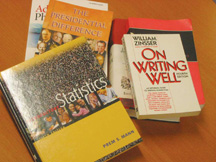MASSPIRG Takes On Textbooks.

MASSPIRG exposes textbook publishers re-releasing new editions with minor cosmetic changes and major price increases.
April 16, 2005
BY JORDAN COLONStaff Writer
I took Psychology 101 during my first semester at UMass Boston. The textbook for this class cost me over one-hundred dollars. When I went to sell it back they offered me a measly ten dollars. At first I was furious, and couldn’t believe that, after one semester’s use, my hundred-dollar textbook was now worth ten. But over the years I’ve accepted publishing companies’ form of highway robbery and learned to financially plan around it. Another friend of mine took an environmental studies course where the cost of the book was over a hundred dollars. When she went to sell it back the bookstore wouldn’t even take the book because a new edition was being printed, every year. How about that irony, a new edition of an environmental studies book printed every year. I’m sure every student has a similar story, and as college students we have all come to expect being ripped off each year by textbook publishing companies.
It is fair to say that almost every student is outraged by this, considering the average college student in the United States shells out an average of $900 dollars a year for textbooks. Ian Cousins, a UMass Boston undergrad, said the following in a press release issued by the Massachusetts Public Interest Research Group (MASSPIRG), “There are students who can just barely afford to go to college. After getting their financial aid and finding a student loan that will have them in debt for the rest of their life, they’re hit with $900 of textbook costs. Even worse is that that cost is totally unnecessary. Textbook prices can and should be made more affordable for students.”
A major problem for professors and students is that there aren’t many other text options. By putting out new editions every few years, the publishing companies discourage the sales of used textbooks. A new edition makes the old ones seem outdated, when in reality there are very minor and often unnecessary revisions to the new text. New editions obviously benefit the publishers, and they can get away with it because they have a strong hold on the market and know that students don’t have many options. This is frustrating for students, because we know we are being ripped off and there is nothing we can do about it. The good news is that the MASSPIRG and other state PIRGs have launched the Affordable Textbooks Campaign to help stop publishers from putting out new editions of textbooks with only minor cosmetic changes.
The latest call to action was spurred by MASSPIRG research that found new textbook revisions reduce the availability of used textbooks, which are 45 percent cheaper than new books. Also, MASSPIRG has found that college textbook prices have increased four times the rate of inflation for other finished goods since 1994.
Math and science students are generally hit the hardest with the increasing textbook costs. Thomson Learning, the company who makes widely-used editions of calculus and physics books, is the under the most heat. Seven-hundred physics and math professors from over 150 of the nation’s largest and most prestigious universities have called on Thomson Learning to stop making unnecessary textbook revisions. However, the industry is more or less unresponsive to the criticism. Because of this, many professors are seeking and using alternative texts, such as e-reserves and older editions. For instance, Duke University professor Dr. Robert Brown is writing his own physics textbook that he plans to post online for free. Texas A&M professor, Wayne Saslow, wrote an introductory physics book, and insisted to his publisher (Academic) that it be published without color. The book sells for under $70.
Although no agreements between Thomson Learning and the Affordable Textbook Campaign have been made, it is good to know that professors from all over the country, as well as student-directed and funded research groups are fighting for less-expensive textbooks. To see how you can get involved in the fight for more affordable books and for general information on the Affordable Textbook Campaign go to www.MakeTextbooksAffordable.org.





















































